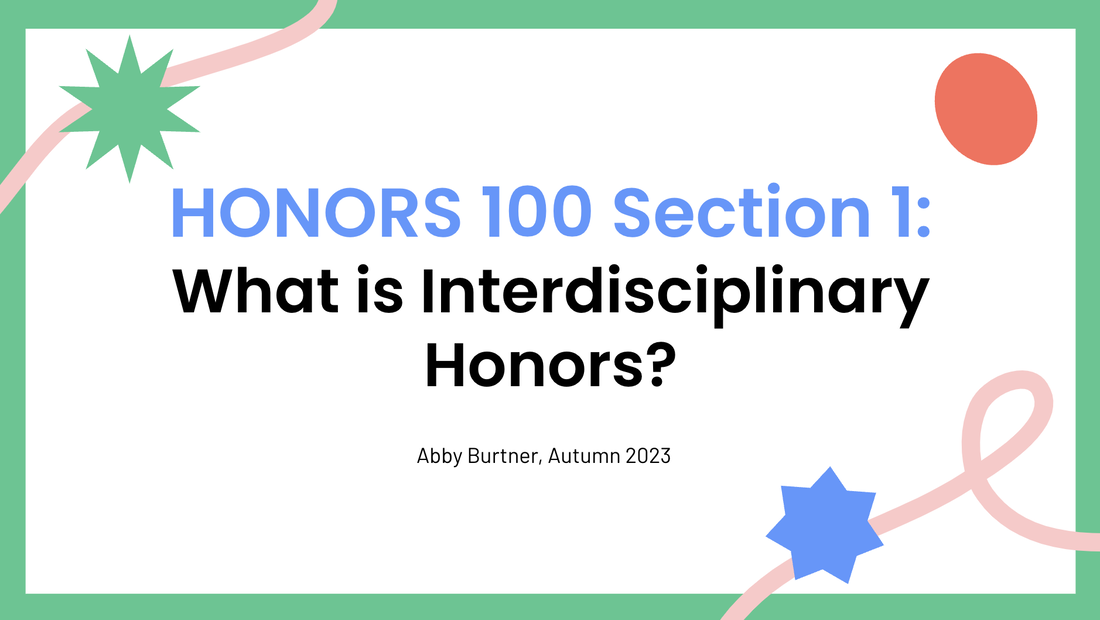Autumn 2023
This quarter I took MATH 126 (Multivariable Calculus), GENOME 371 (Introduction to Genetics), HONORS 397 (Honors Peer Educator seminar), and BIOC 499 (Undergraduate Research).
|
Your browser does not support viewing this document. Click here to download the document.
|
artifact: teaching and learningI had the opportunity to be a Peer Educator for a section of HONORS 100, Introduction to Interdisciplinary Honors, this quarter. This position proved to be a good way to get a sense of whether I like to teach and also to give back to the Honors community. Read my final reflection here!
|
Winter 2024
This quarter I took CHEM 452 (Physical Chemistry for Biochemists I), HONORS 211 (Honors Humanities: What is Time? Understanding and Organizing Temporalities), and BIOC 499 (Undergraduate Research).
artifact: plans for the future are falling into place!It's hard to explain how shocked I was by the news I have received this quarter regarding the global fellowship and graduation school applications I submitted last fall.
I was beyond surprised to learn that I was one of 16 Americans awarded the Churchill Scholarship to complete a one year research-based master's in Pathology at the University of Cambridge next year! I am so beyond thrilled to be heading to the UK next year to deepen my immunological knowledge and prepare me for my PhD. The UW's Undergraduate Academic Affairs office wrote a couple of very nice articles about my plans for the scholarship and my research trajectory generally. Really not expecting to be awarded one of the global fellowships I applied to (which included Marshall and Fulbright as well!), I also applied to PhD programs. I absolutely loved flying around the country to interview at different schools (some photos above!). I met so many cool people and had so many great conversations about science with the faculty at these schools. It's going to be a very tough decision as to where to attend after I complete my master's next year! |
artifact: thinking about timeThis quarter I took my last Interdisciplinary Honors class, fittingly called "What is Time? Understanding and Organizing Temporalities" as I decide where I'll be going after I graduate and leave the class-oriented perspective that has structured the majority of my time for the past 17 years of my life.
I came into this class defining the arrow of time as the one pointing in the direction of increasing entropy. I had not thought much about time beyond the standard disbelief at how warped time becomes in human experience. Ultimately, this class has led me to expand my definition of time from the purely scientific to acknowledge the blend of cultural and societal influences that affect my understanding of time in lived reality and shared history. I particularly enjoyed the weeks on labor/working time, historic time, queer time, and "crip time". As a big lover of British literature, I had a lot of fun writing my final project on time in Thomas Hardy's Tess of d'Urbervilles, which you can read here. I'm hoping to visit Hardy's house while I'm living in the UK next year! Thinking about time this quarter has also influenced how I think about my personal future. I’ve been a student in the American public education system for three-quarters of my life, but I am graduating this spring and entering a new stage of life not mainly governed by classes. How will I structure my time when academics play a diminished role? Will I stop thinking about the future as much as I currently do, and more about the present/past? I’ve been in this linear “pipeline” of education thus far in my life, which at times feels like it operates in service of one ultimate goal: graduation. As I go into the “postgraduate” world (ok, fine, I’m getting a master’s and a PhD next, but those are different from K-12 and undergraduate education systems), how will I confront time that doesn’t feel like it is funneling me towards one outcome? Or will it still be like I’m being funneled towards some outcome (e.g., marriage according to reproductive futurism)? I am fortunate enough to call my time my own, but I no longer kid myself into thinking that how I prefer to spend my time is solely a result of my personal beliefs gained from lived experiences. But having that clarity, I can now seek out ways to make sure how I spend my time aligns with my personal beliefs and not just those of the society I find myself in. |
Spring 2024
XXX
artifact:XXX
|
XXX
artifactXXX
|







